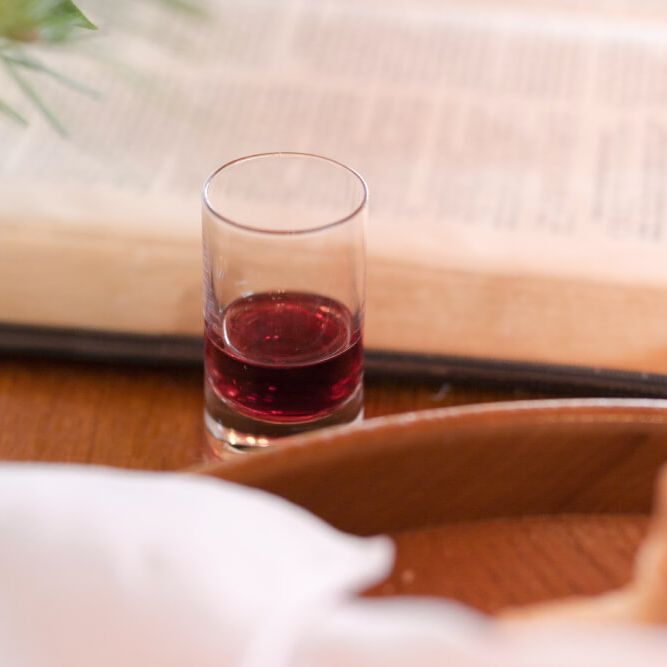I still remember the first communion service I ever witnessed. I was about ten years old and was not yet a follower of Jesus. Throughout the service, I was filled with conflicting emotions. On the one hand, I thought the whole thing was extremely odd. The pastor was talking about Jesus’ body and blood and how that related to the bread and the wine. He referred to it as the “Lord’s Supper,” a term I had never heard. He read a passage from the Bible that was unlike anything I had ever read: “For as often as you eat this bread and drink the cup, you proclaim the Lord’s death until he comes” (1 Cor. 11:26). What did that mean? The whole thing, from start to finish, seemed strange.
On the other hand, I was greatly intrigued! The people around me seemed eager to walk forward and receive the bread and wine. Their faces suggested they were celebrating something special! But, at the same time, it wasn’t like any celebration I had seen before. I was accustomed to celebrations that were light and carefree: passing a spelling test, watching the Rockies win a game (which didn’t happen often), or reaching the last level on a video game. The celebration of communion felt much different. It felt weighty and serious. It felt much more important and powerful.
After the service, despite my conflicting emotions, I was left with two impressions. The first was that whatever the Lord’s Supper was, it was something I wanted to participate in. My second impression was that I had to learn more about it.
What is the Lord’s Supper?
Many of us have similar feelings, impressions, and thoughts about the Lord’s Supper. Some of us have participated in it for years, but have never really wrapped our head around what it is exactly. Some have grown up being taught that it’s a symbol that helps us reflect on Jesus’s death. Others have learned that the bread and wine of communion are transformed into the body and blood of Jesus. No matter how we struggle to fully understand the Lord’s Supper, it’s a good question to ask. What is the Lord’s Supper?
The best answer, I believe, to this question is found in the Westminster Shorter Catechism. This Catechism was a booklet, written by pastors in a question-and-answer format, for parents to help teach their children the basic truths of Christianity. Written in typical 17th-century English, question 96 asks,
Q.96. What is the Lord’s Supper?
A. The Lord’s Supper is a sacrament, wherein, by giving and receiving bread and wine, according to Christ’s appointment, his death is showed forth; and the worthy receivers are … by faith, made partakers of his body and blood, with all his benefits, to their spiritual nourishment, and growth in grace.
This definition says a lot about the Lord’s Supper, but to understand it more fully, three points stand out.
First, it tells us that the Lord’s Supper is a sacrament. Sacraments are holy signs and physical elements given by Jesus to signify and seal his grace to Christians. There are two sacraments in the New Testament: baptism and the Lord’s Supper. Just as we hear the message of grace and forgiveness through sermons in worship, sacraments are physical and tangible and help us see, taste, and touch the grace and forgiveness of Jesus. In baptism, we see and feel the grace of Jesus who cleanses our sins by his blood and gives us new life by His Spirit. Likewise, in the Lord’s Supper, we not only have the chance to hear that we have been forgiven by Jesus’s sacrifice on the cross, we can actually “taste and see that the Lord is good” (Ps. 34:8) by receiving bread and wine!
It's important to remember, though, that a sacrament is not merely a sign. A sacrament is also a seal of God’s grace in Jesus. In the ancient world, kings would write royal documents and laws that would affect the lives of everyone in their kingdom. When they wrote these documents, they would close their letters with a seal that showed everyone that the decree was truly from the king. It was a way of authenticating the decree and saying that the letter belonged to the king. The same is true with sacraments. When followers of Jesus celebrate the Lord’s Supper, we are doing more than remembering the forgiveness of Jesus. We are being sealed by Jesus himself. He is sealing his forgiveness to our lives and reminding us that we belong to him by grace through faith!
Secondly, the Catechism also tells us that the Lord’s Supper represents Jesus’s body and blood. Jesus made this clear on the night he was betrayed, when he “took bread, and after blessing it broke it and gave it to the disciples, and said, ‘Take, eat; this is my body.’ And he took a cup, and when he had given thanks he gave it to them, saying, ‘Drink of it, all of you, for this is my blood of the covenant, which is poured out for many for the forgiveness of sins’” (Matt. 26:26–29). The Lord’s Supper takes something ordinary—bread and wine—and shows the world something extraordinary. It shows the body of Jesus given for us and the blood of Jesus shed for the forgiveness of sins.
Lastly, we see that the Lord’s Supper is a means of grace. In other words, the Lord’s Supper is a means that God uses to nourish our souls and grow us in grace. There are several means of God’s grace—reaching, teaching, reading Scripture, prayer. But, God also uses sacraments, namely, the Lord’s Supper, to communicate his grace to us! If we wanted to grow physically, we could use several different means. We could eat high protein foods. We could exercise regularly. These would be means of growing physically. The same is true spiritually when we make use of the means of grace. As followers of Jesus, we want to regularly worship God, pray to him, hear his word through preaching and teaching as often as possible, pursue baptism for ourselves and celebrate the baptism of others, and, lastly, participate in the Lord’s Supper as often as possible!
Why Does This Matter?
As followers of Jesus, we recognize that there is no way to grow in our relationship with him apart from his grace. For that reason, we want to immerse ourselves in the things Jesus has given us to grow in our relationship with him. We want to be people who make worship the highlight of our week. It is the place where the means of grace are offered to us—where we come together to celebrate by hearing Scripture, praying to God, listening to preaching, and we receive the sacraments Jesus uses to grow us as disciples.






